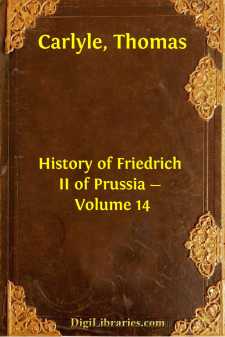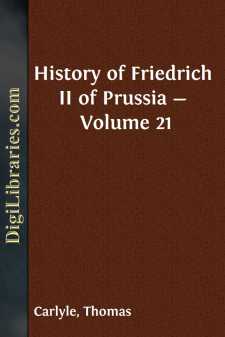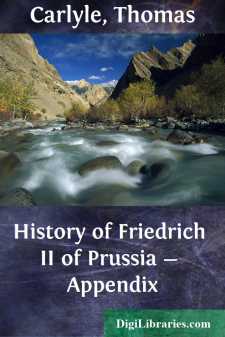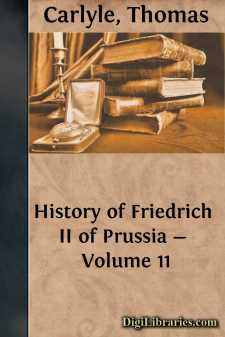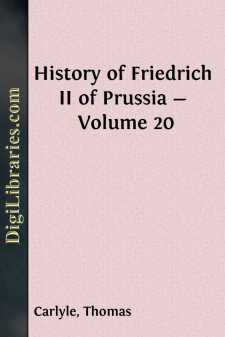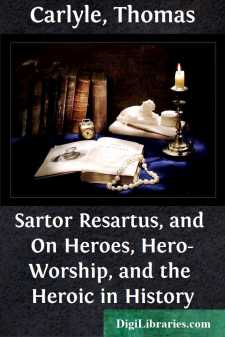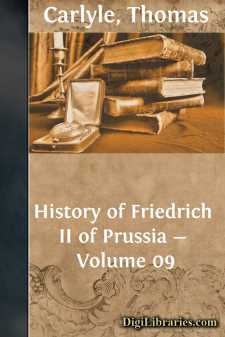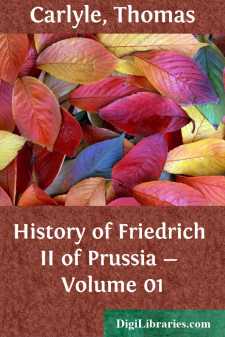Categories
- Antiques & Collectibles 13
- Architecture 36
- Art 48
- Bibles 22
- Biography & Autobiography 813
- Body, Mind & Spirit 142
- Business & Economics 28
- Children's Books 17
- Children's Fiction 14
- Computers 4
- Cooking 94
- Crafts & Hobbies 4
- Drama 346
- Education 46
- Family & Relationships 57
- Fiction 11829
- Games 19
- Gardening 17
- Health & Fitness 34
- History 1377
- House & Home 1
- Humor 147
- Juvenile Fiction 1873
- Juvenile Nonfiction 202
- Language Arts & Disciplines 88
- Law 16
- Literary Collections 686
- Literary Criticism 179
- Mathematics 13
- Medical 41
- Music 40
- Nature 179
- Non-Classifiable 1768
- Performing Arts 7
- Periodicals 1453
- Philosophy 64
- Photography 2
- Poetry 896
- Political Science 203
- Psychology 42
- Reference 154
- Religion 513
- Science 126
- Self-Help 84
- Social Science 81
- Sports & Recreation 34
- Study Aids 3
- Technology & Engineering 59
- Transportation 23
- Travel 463
- True Crime 29
Sort by:
by:
Thomas Carlyle
Chapter I.—FRIEDRICH RESUMES HIS PEACEABLE PURSUITS. Friedrich's own Peace being made on such terms, his wish and hope was, that it might soon be followed by a general European one; that, the live-coal, which had kindled this War, being quenched, the War itself might go out. Silesia is his; farther interest in the Controversy, except that it would end itself in some fair manner, he has none....
more...
by:
Thomas Carlyle
CHAPTER I. HARALD HAARFAGR. Till about the Year of Grace 860 there were no kings in Norway, nothing but numerous jarls,—essentially kinglets, each presiding over a kind of republican or parliamentary little territory; generally striving each to be on some terms of human neighborhood with those about him, but,—in spite of "Fylke Things" (Folk Things, little parish parliaments), and small...
more...
by:
Thomas Carlyle
Chapter I.—PREFATORY. The Twelve Hercules-labors of this King have ended here; what was required of him in World-History is accomplished. There remain to Friedrich Twenty-three Years more of Life, which to Prussian History are as full of importance as ever; but do not essentially concern European History, Europe having gone the road we now see it in. On the grand World-Theatre the curtain has fallen...
more...
by:
Thomas Carlyle
A DAY WITH FRIEDRICH.—(23d July, 1779.) "OBERAMTMANN (Head-Manager) Fromme" was a sister's son of Poet, Gleim,—Gleim Canon of Halberstadt, who wrote Prussian "grenadier-songs" in, or in reference to, the Seven-Years War, songs still printed, but worth little; who begged once, after Friedrich's death, an OLD HAT of his, and took it with him to Halberstadt (where I hope it...
more...
by:
Thomas Carlyle
Chapter I. — PHENOMENA OF FRIEDRICH'S ACCESSION. In Berlin, from Tuesday, 31st May, 1740, day of the late King's death, till the Thursday following, the post was stopped and the gates closed; no estafette can be despatched, though Dickens and all the Ambassadors are busy writing. On the Thursday, Regiments, Officers, principal Officials having sworn, and the new King being fairly in the...
more...
by:
Thomas Carlyle
Chapter I.—FIFTH CAMPAIGN OPENS. There were yet, to the world's surprise and regret, Three Campaigns of this War; but the Campaign 1760, which we are now upon, was what produced or rendered possible the other two;—was the crisis of them, and is now the only one that can require much narrative from us here. Ill-luck, which, Friedrich complains, had followed him like his shadow, in a strange and...
more...
by:
Thomas Carlyle
INTRODUCTION One of the most vital and pregnant books in our modern literature, “Sartor Resartus” is also, in structure and form, one of the most daringly original. It defies exact classification. It is not a philosophic treatise. It is not an autobiography. It is not a romance. Yet in a sense it is all these combined. Its underlying purpose is to expound in broad outline certain ideas which lay at...
more...
by:
Thomas Carlyle
Chapter I. — PRINCESS ELIZABETH CHRISTINA OF BRUNSWICK-BEVERN. We described the Crown-Prince as intent to comply, especially in all visible external particulars, with Papa's will and pleasure;—to distinguish himself by real excellence in Commandantship of the Regiment Goltz, first of all. But before ever getting into that, there has another point risen, on which obedience, equally essential,...
more...
by:
Thomas Carlyle
Chapter I. — CHAPLAIN MULLER WAITS ON THE CROWN-PRINCE. Friedrich's feelings at this juncture are not made known to us by himself in the least; or credibly by others in any considerable degree. As indeed in these confused Prussian History-Books, copulent in nugatory pedantisms and learned marine-stores, all that is human remains distressingly obscure to us; so seldom, and then only as through...
more...
by:
Thomas Carlyle
Chapter I. — PROEM: FRIEDRICH'S HISTORY FROM THE DISTANCE WE ARE AT. About fourscore years ago, there used to be seen sauntering on the terraces of Sans Souci, for a short time in the afternoon, or you might have met him elsewhere at an earlier hour, riding or driving in a rapid business manner on the open roads or through the scraggy woods and avenues of that intricate amphibious Potsdam...
more...


